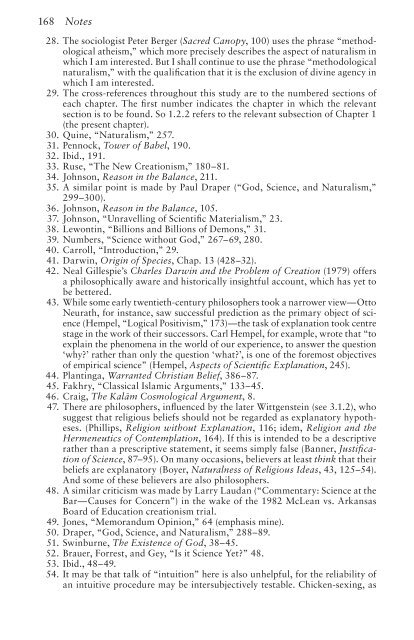Theism and Explanation - Appeared-to-Blogly
Theism and Explanation - Appeared-to-Blogly
Theism and Explanation - Appeared-to-Blogly
You also want an ePaper? Increase the reach of your titles
YUMPU automatically turns print PDFs into web optimized ePapers that Google loves.
168 Notes<br />
28. The sociologist Peter Berger (Sacred Canopy, 100) uses the phrase “methodological<br />
atheism,” which more precisely describes the aspect of naturalism in<br />
which I am interested. But I shall continue <strong>to</strong> use the phrase “methodological<br />
naturalism,” with the qualifi cation that it is the exclusion of divine agency in<br />
which I am interested.<br />
29. The cross-references throughout this study are <strong>to</strong> the numbered sections of<br />
each chapter. The fi rst number indicates the chapter in which the relevant<br />
section is <strong>to</strong> be found. So 1.2.2 refers <strong>to</strong> the relevant subsection of Chapter 1<br />
(the present chapter).<br />
30. Quine, “Naturalism,” 257.<br />
31. Pennock, Tower of Babel, 190.<br />
32. Ibid., 191.<br />
33. Ruse, “The New Creationism,” 180–81.<br />
34. Johnson, Reason in the Balance, 211.<br />
35. A similar point is made by Paul Draper (“God, Science, <strong>and</strong> Naturalism,”<br />
299–300).<br />
36. Johnson, Reason in the Balance, 105.<br />
37. Johnson, “Unravelling of Scientifi c Materialism,” 23.<br />
38. Lewontin, “Billions <strong>and</strong> Billions of Demons,” 31.<br />
39. Numbers, “Science without God,” 267–69, 280.<br />
40. Carroll, “Introduction,” 29.<br />
41. Darwin, Origin of Species, Chap. 13 (428–32).<br />
42. Neal Gillespie’s Charles Darwin <strong>and</strong> the Problem of Creation (1979) offers<br />
a philosophically aware <strong>and</strong> his<strong>to</strong>rically insightful account, which has yet <strong>to</strong><br />
be bettered.<br />
43. While some early twentieth-century philosophers <strong>to</strong>ok a narrower view—Ot<strong>to</strong><br />
Neurath, for instance, saw successful prediction as the primary object of science<br />
(Hempel, “Logical Positivism,” 173)—the task of explanation <strong>to</strong>ok centre<br />
stage in the work of their successors. Carl Hempel, for example, wrote that “<strong>to</strong><br />
explain the phenomena in the world of our experience, <strong>to</strong> answer the question<br />
‘why?’ rather than only the question ‘what?’, is one of the foremost objectives<br />
of empirical science” (Hempel, Aspects of Scientifi c <strong>Explanation</strong>, 245).<br />
44. Plantinga, Warranted Christian Belief, 386–87.<br />
45. Fakhry, “Classical Islamic Arguments,” 133–45.<br />
46. Craig, The Kalām Cosmological Argument, 8.<br />
47. There are philosophers, infl uenced by the later Wittgenstein (see 3.1.2), who<br />
suggest that religious beliefs should not be regarded as explana<strong>to</strong>ry hypotheses.<br />
(Phillips, Religion without <strong>Explanation</strong>, 116; idem, Religion <strong>and</strong> the<br />
Hermeneutics of Contemplation, 164). If this is intended <strong>to</strong> be a descriptive<br />
rather than a prescriptive statement, it seems simply false (Banner, Justifi cation<br />
of Science, 87–95). On many occasions, believers at least think that their<br />
beliefs are explana<strong>to</strong>ry (Boyer, Naturalness of Religious Ideas, 43, 125–54).<br />
And some of these believers are also philosophers.<br />
48. A similar criticism was made by Larry Laudan (“Commentary: Science at the<br />
Bar—Causes for Concern”) in the wake of the 1982 McLean vs. Arkansas<br />
Board of Education creationism trial.<br />
49. Jones, “Memor<strong>and</strong>um Opinion,” 64 (emphasis mine).<br />
50. Draper, “God, Science, <strong>and</strong> Naturalism,” 288–89.<br />
51. Swinburne, The Existence of God, 38–45.<br />
52. Brauer, Forrest, <strong>and</strong> Gey, “Is it Science Yet?” 48.<br />
53. Ibid., 48–49.<br />
54. It may be that talk of “intuition” here is also unhelpful, for the reliability of<br />
an intuitive procedure may be intersubjectively testable. Chicken-sexing, as



